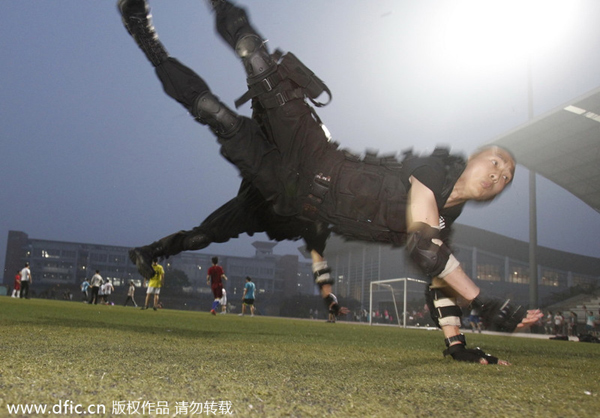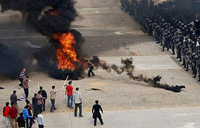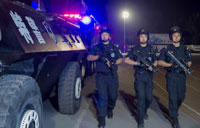Intl actions urged in China's anti-terror fight
Updated: 2014-05-12 13:45
(Xinhua)
|
 |
| A university student gets training to become a prospective anti-terrorism police officer on May 10, 2014, in Southwest University of Political Science & Law, Chongqing city. [Photo/icpress.cn] |
BEIJING -- In addition to enhancing domestic capacity to fight terrorism, it is vital for China to cut terrorists' international connections to win the battle, an anti-terrorism expert said in an article carried by the Monday
|
|
|
 |
"The changing international environment was an important factor that led to China's worsening terror threats in such a short period," Zhang Jiadong with Fudan University said in the flagship newspaper of the Communist Party of China, referring to the latest string of terror attacks.
An explosion at a railway station in Urumqi, regional capital of Northwest China's Xinjiang, on April 30 followed terrorist attacks at a train station in the southwestern city of Kunming in March and at China's iconic Tian'anmen Square in Beijing last October.
Zhang said the international terrorism tide has rippled across to China.
Citing a government report of the United States, he said five of the six countries most frequently hit by terror attacks in 2013 were China's neighbors, with more than 4,600 terror attacks occurring within their borders last year.
"Despite a relatively good security situation, it's difficult for China to stand aloof," he said.
Following the US strategic shift from anti-terrorism to conventional security, terrorists gradually begin to expand their targets to countries other than the US, according to Zhang.
The conflicts between China's rise and anti-China forces also play their part in the mounting terror threats, he said.
The problem of "East Turkistan" separatist forces is actually a conspiracy of political organizations operating under the pretext of "democracy and human rights" and terrorism groups harboring religious extremism, according to Zhang.
"Terrorism is an international problem," he said. "Without the political, economic, technical and public opinion support abroad, terrorist groups usually cannot survive, let alone expand."
Zhang called for efforts to set up and consolidate anti-terror mechanisms, such as the regional anti-terrorist structure of the Shanghai Cooperation Organization, and proposed the establishment of an Asian anti-terror framework to enhance exchanges and coordination in the field.
He suggested China create a set of counter measures to give necessary warnings or even punitive responses to overseas organizations that unscrupulously support domestic terrorist forces, he said.
China should also take initiative to take part in international anti-terror cooperation because many anti-China terrorist forces base their leading organs and training bases abroad, Zhang said.
